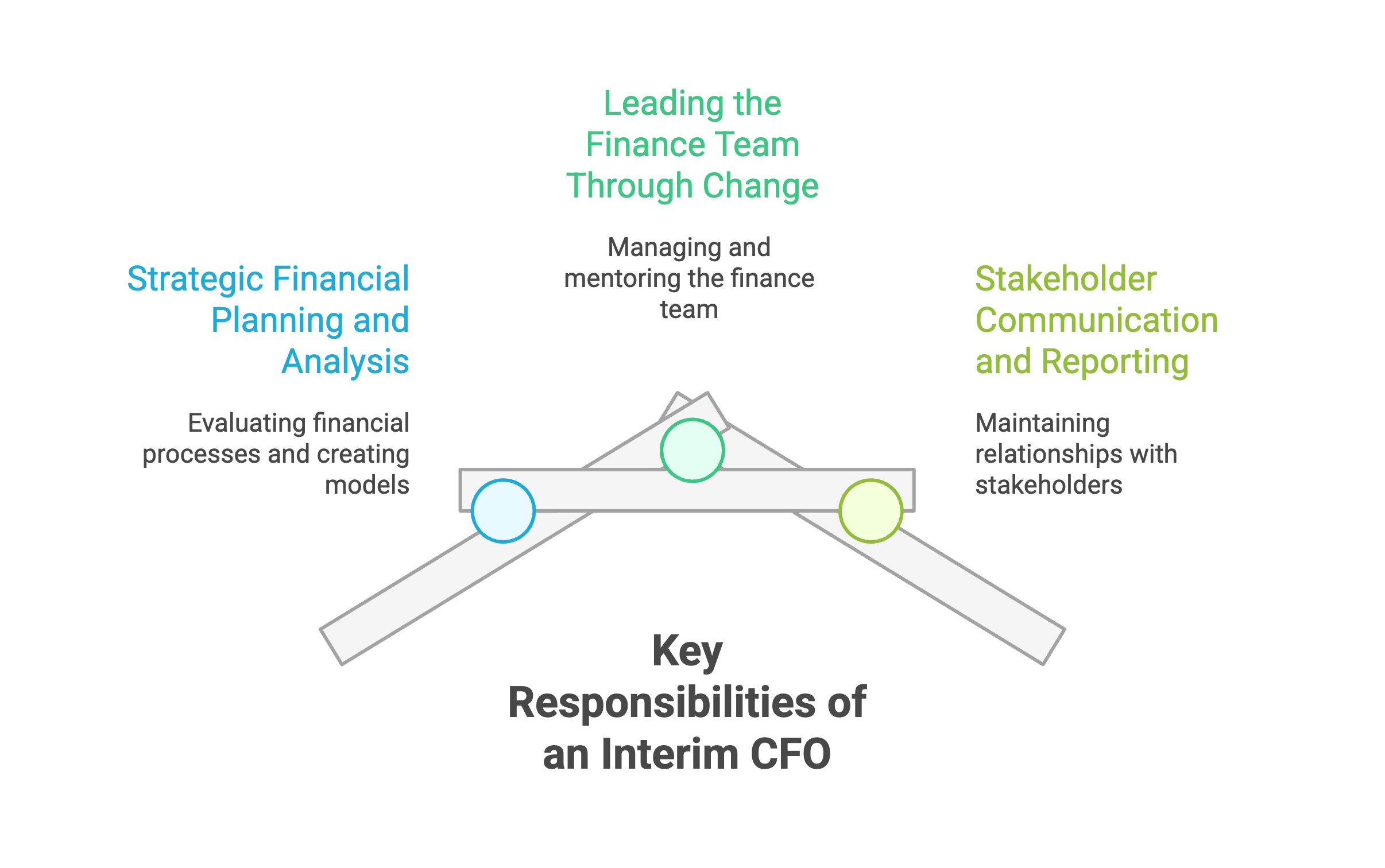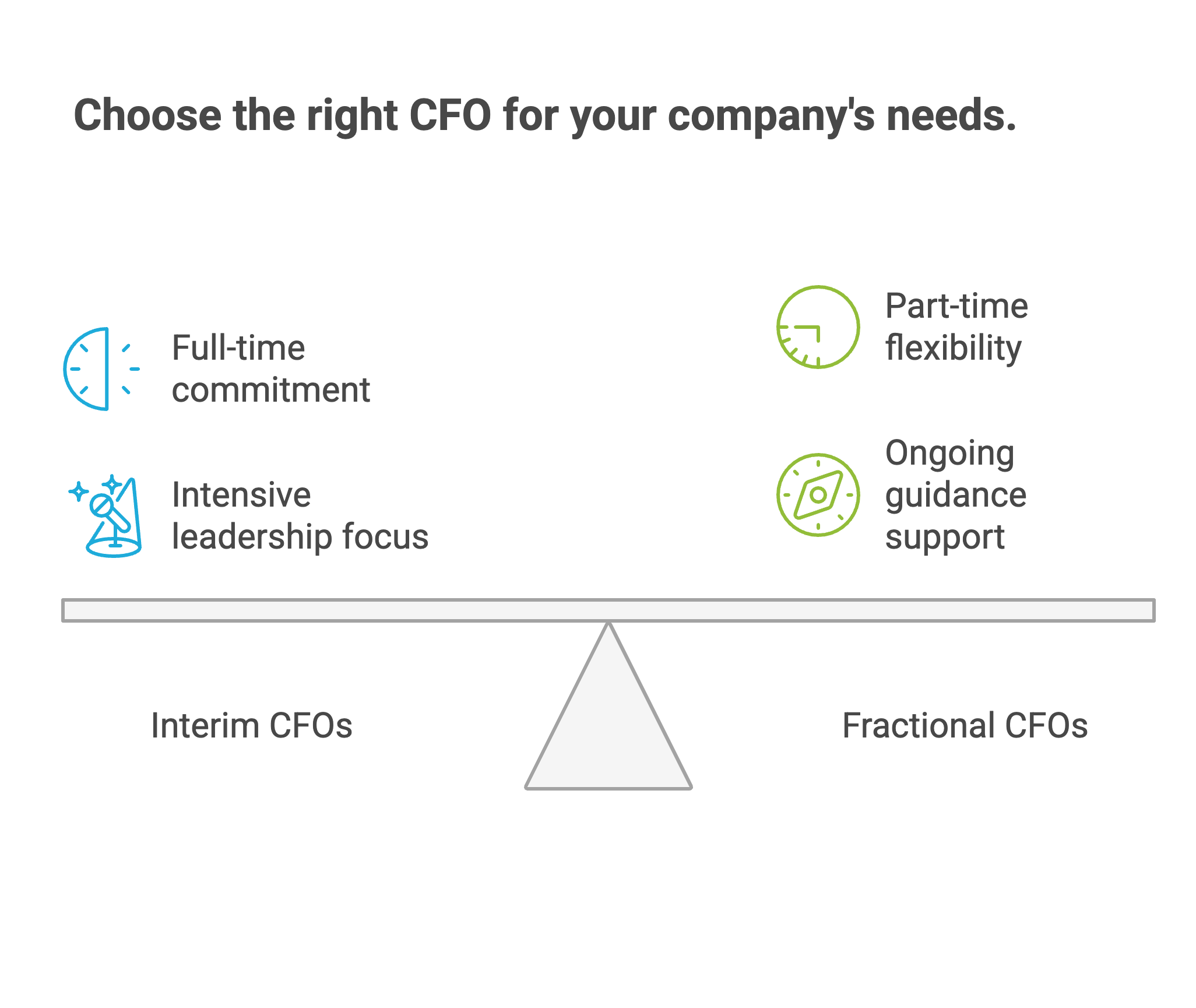Running a business without proper financial leadership is like trying to navigate without a compass. Whether your company is going through a major transition, your previous CFO just left, or you're preparing for significant growth, understanding interim CFO responsibilities can make the difference between thriving and merely surviving.
Let's dive into what these financial experts actually do and how they can transform your business during critical periods.
An interim CFO steps into your organization to handle the same core duties as a permanent CFO, but with a specific focus on immediate needs and short-term objectives. Think of them as financial firefighters who can also build long-term strategies.
Their primary responsibilities include overseeing all financial operations, ensuring accurate financial reporting, and maintaining your company's financial health during periods of change. Unlike fractional CFOs who work part-time across multiple clients, interim CFOs typically work full-time for a specific period, usually ranging from a few months to over a year.
The beauty of hiring an interim CFO lies in their ability to hit the ground running. They bring years of experience from various industries and can quickly assess your finance function, identify gaps, and implement solutions without the lengthy onboarding process that comes with permanent hires.
When you hire an interim CFO, you're bringing in someone who can immediately evaluate your financial planning processes. They'll review your current forecasting methods, analyze cash flow patterns, and ensure your financial strategy aligns with business goals.
These professionals excel at creating robust financial models that help predict future performance. They don't just crunch numbers; they translate complex financial data into actionable insights that drive business decisions.
One of the most critical interim CFO responsibilities involves managing and mentoring your existing finance team. During times of transition, employees often feel uncertain about their roles and the company's direction.
A skilled interim executive brings stability and clear direction. They assess team capabilities, identify skill gaps, and provide the leadership needed to maintain productivity during uncertain times. This includes restructuring workflows when necessary and ensuring all team members understand their evolving responsibilities.
Maintaining strong relationships with investors, lenders, and board members becomes crucial during transitional periods. Interim CFOs excel at stakeholder communication because they understand that transparency builds trust.
They prepare detailed financial reports, lead investor meetings, and ensure all parties stay informed about the company's financial position. Their objective perspective often brings fresh insights that internal teams might miss.

Companies often need interim financial leadership during mergers, acquisitions, or significant restructuring initiatives. These situations require someone who can navigate complex financial arrangements while maintaining day-to-day operations.
The chief financial officer role becomes even more critical during these periods because decisions made today impact long-term success. An experienced interim CFO brings the expertise needed to evaluate deals, assess financial risks, and guide companies through complex transitions.
Fast-growing companies frequently outgrow their current financial infrastructure. What worked for a million-dollar business might not work for a ten-million-dollar operation. This is where interim CFOs prove invaluable.
They can quickly assess your current finance function, identify areas needing improvement, and implement systems that support continued growth. Their experience with scaling operations means they know which processes to prioritize and which can wait.
Sometimes you need to hire an interim CFO immediately due to unexpected departures or financial crises. These professionals specialize in crisis management and can quickly stabilize operations while you search for a permanent solution.
Their ability to assess financial health rapidly and implement corrective measures can literally save companies from bankruptcy or serious financial distress.
While both provide flexible financial leadership, the key difference lies in commitment level and scope. Fractional CFOs typically work part-time with multiple clients, making them ideal for smaller companies needing ongoing financial guidance.
Interim CFOs, however, work full-time with single companies during specific periods. They're better suited for situations requiring immediate, intensive financial leadership or companies going through significant changes.
Hiring a permanent CFO involves lengthy recruitment processes, substantial salary commitments, and integration challenges. Sometimes companies need immediate financial leadership but aren't ready for a permanent hire.
Interim CFOs provide immediate expertise without long-term commitments. They can maintain operations, implement necessary changes, and even help recruit their permanent replacement when the time is right.
One of the most valuable aspects of bringing in an interim CFO is their objective viewpoint. They're not emotionally attached to existing processes and can identify inefficiencies that internal teams might overlook.
This fresh perspective often leads to significant improvements in financial reporting accuracy, cost management, and overall operational efficiency. They ask the hard questions that need asking and propose solutions based on best practices from various industries.
Managing financial risk becomes crucial during transitional periods. Interim CFOs bring extensive experience in risk management and ensure your company maintains compliance with relevant regulations.
They understand how to balance growth initiatives with prudent financial management, helping companies avoid costly mistakes while pursuing opportunities.

Before deciding to hire an interim CFO, honestly assess your current situation. Are you facing immediate financial challenges that require full-time attention? Do you need someone to lead a specific initiative like a merger or restructuring project?
Consider the timeline for your needs. If you require financial leadership for several months while searching for a permanent CFO, an interim solution makes perfect sense. For ongoing, part-time financial guidance, a fractional CFO might be more appropriate.
The best interim CFOs combine technical expertise with strong leadership skills. Look for professionals with experience in your industry and situations similar to yours. They should demonstrate the ability to quickly understand your business model and integrate with your existing team.
Don't overlook cultural fit. Even though the arrangement is temporary, this person will be making important decisions that affect your company's future. They need to align with your values and work well with your leadership team.
What are the main interim CFO responsibilities?
Interim CFOs handle strategic financial planning, financial reporting, team leadership, stakeholder communication, risk management, and operational oversight during transitional periods or specific business initiatives.
How long do interim CFOs typically stay with a company?
Most interim CFO engagements last between 6 to 18 months, depending on the specific needs and circumstances. Some may be shorter for crisis situations, while complex transitions might require longer commitments.
When should I hire an interim CFO instead of a permanent one?
Consider hiring an interim CFO during transitions, mergers, rapid growth phases, after unexpected departures, or when you need immediate financial leadership but aren't ready for a permanent hire.
How do interim CFOs differ from fractional CFOs?
Interim CFOs work full-time for specific periods with single companies, while fractional CFOs work part-time across multiple clients. Interim CFOs are better for intensive, short-term needs.
What qualifications should I look for in an interim CFO?
Look for relevant industry experience, proven track record in similar situations, strong leadership skills, technical expertise in financial management, and the ability to integrate quickly with existing teams.
How much does it cost to hire an interim CFO?
Costs vary based on experience, company size, and engagement complexity. While typically more expensive per day than permanent CFOs, they often provide better value for short-term needs without long-term commitments.
Can an interim CFO help find their permanent replacement?
Yes, many interim CFOs assist in recruiting their permanent replacement. They understand the role requirements intimately and can help evaluate candidates and facilitate smooth transitions.
What happens to my finance team when an interim CFO arrives?
A good interim CFO focuses on supporting and developing your existing finance team. They provide leadership, identify skill gaps, improve processes, and ensure team stability during transitional periods.
The right interim CFO can transform your financial operations and guide your company through challenging periods. By understanding their responsibilities and knowing when to bring them in, you're positioning your business for continued success, regardless of what challenges lie ahead.

A practical comparison of hiring a freelancer vs using a dedicated offshore accounting team, focusing on continuity, quality control, security, and scaling.

How CPA firms outsource payroll and 1099 work to reduce penalties and admin load, with a clean workflow for approvals, filings, and year-end reporting.

Practical do's and don'ts for CPA firms outsourcing accounting work, based on common failure points and what successful rollouts do differently.